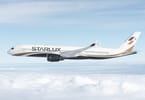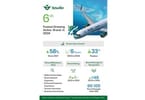After the markets closed on Thursday night, the British Airways board marched into a meeting in its head office, close to Heathrow, for what would prove to be a defining moment for the airline.
Earlier in the day, the board of Iberia had met in Madrid to agree the terms of a deal with the British carrier, 16 months after the two sides had announced that they were in merger talks. BA chief executive Willie Walsh had previously suggested that corporate governance – the make-up of the board – had been a sticking point in the discussions. But the talks accelerated after a change in management at Iberia over the summer. Antonio Vázquez, who took over the Spanish carrier, sold tobacco firm Altadis to Britain’s Imperial Tobacco in 2008 and has a reputation as a dealmaker.
It also seems likely that huge losses incurred by both airlines had sharpened the focus of the two companies on getting a deal done. After little more than an hour, the BA board emerged and the agreement was in place. An announcement was put out by 8.30pm that evening.
The two sides hope the deal will return the combined group to profitability, allowing them to slash costs and improve buying power on the likes of fuel and aircraft, generating savings of €400m (£357m) a year. It would also create potential for higher revenue by offering a far wider range of routes to passengers, combining BA’s strength across the Atlantic with Iberia’s network across South America. “Consolidation is happening in our industry and it is critical that BA starts participating in that,” Walsh said on Friday.
That is, if BA can sort out its pension deficit – thought to be about £2.6bn. Its schemes are subject to a valuation later this year, after which pension trustees and BA management will need to negotiate how much cash the airline needs to pump in to keep them afloat. Even then, the agreement will need rubber-stamping by the pensions regulator, which is not expected to make a ruling until next September, and the merger will not be completed until the issue is resolved. It has been a long courtship, and it will be a long engagement.
“It was a deal that was waiting to be done and that needed to be done,” said one source close to the agreement. “Europe will ultimately be divided up into three or four full-service airlines and one or two low-cost carriers. Nine months ago, BA was talking about a merger with Qantas, a deal with Iberia and a transatlantic alliance with American. Qantas has fallen away … and Willie needed to pull off at least one of the others.”
By Walsh’s own admission, BA has been in a “fight for survival” for much of this year. Over the past decade, the airline industry has lurched from one crisis to another: the terrorist attacks of 2001, the threat of liquid bombs, Sars, swine flu and a soaring oil price. BA itself also suffered the troubled opening of its new base at Heathrow, Terminal Five, which most agree has now been turned into a success.
But it has been the global recession that has wrought the most damage: BA is losing £1.6m a day. Earlier this month, it reported half-year losses of £292m on top of record losses of £401m for the previous year. This will be the first time in the carrier’s history that it has recorded two successive years in the red.
The deal with Iberia was broadly welcomed by the City. The new firm will generate annual revenues of £13.5bn – making it the third-largest airline in the world – carry 61.5m passengers and fly to 205 airports. It will be headquartered in London, although domiciled in Madrid for tax purposes, with Walsh chief executive and Vázquez as chairman. Both brands will continue to exist.
John Strickland, an airline consultant, says BA had been “feeling more and more left behind” as rivals Air France and KLM merged and Lufthansa absorbed Swiss International Airlines in 2005 and subsequently Brussels Airlines, Austrian Airlines and the British carrier BMI.
“Air France-KLM is the shiny example of an airline merger,” he says. “It was a deal that wasn’t blood-laden for staff. Whether it was pragmatism or foresight, they kept two brands and two functioning head offices. They looked at cost savings but it wasn’t brutal in human terms and customers have been kept happy. But there has been an enormous upturn in revenue. It really has been a case of one plus one equals three… It is a model that has worked and is something that BA and Iberia will have learned from.”
Walsh, 48, who joined BA in 2005, made his mark at Aer Lingus, where he joined as a pilot and worked his way up to chief executive. He turned the business into an aggressive low-cost operator and while he was there spent two years in Mallorca, where he ran Futura, a charter airline owned by the Irish group. His Spanish, apparently, is not so bad.
It seems unlikely that Walsh will have much pause for breath after sealing the deal. BA cabin crew have threatened a strike over job losses and changes to their terms; the airline is already cutting 4,900 posts. The unions are also a potential obstacle in the Iberia deal, seeking assurances that there will be no further compulsory redundancies in return for lending support. And BA is still awaiting a verdict from Washington and Brussels on its alliance with American Airlines.
“BA’s problems are serious but they are arguably no worse than anyone else’s,” says Strickland. “And they are not paralysed, or twiddling their thumbs; they are working in a wide range of fields to improve the situation… And in the main, the staff have bitten the bullet and seen the need for change. Willie Walsh is very well regarded by investors and the deal with Iberia is a key plank in moving forward. It is a feather in his cap.”
QUÈ TREURE D'AQUEST ARTICLE:
- Earlier in the day, the board of Iberia had met in Madrid to agree the terms of a deal with the British carrier, 16 months after the two sides had announced that they were in merger talks.
- The two sides hope the deal will return the combined group to profitability, allowing them to slash costs and improve buying power on the likes of fuel and aircraft, generating savings of €400m (£357m) a year.
- Even then, the agreement will need rubber-stamping by the pensions regulator, which is not expected to make a ruling until next September, and the merger will not be completed until the issue is resolved.






















